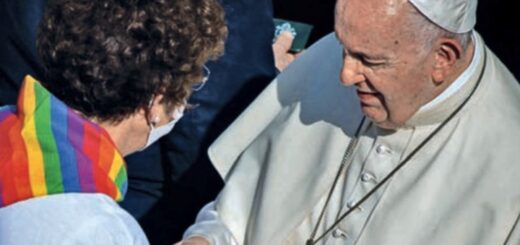Timothy Radcliffe. Love in freedom, between sexuality and chastity
Review by Antonio De Caro*
"We must love people so that they are free to love others more than us".
“Love in freedom. Sexuality and chastity"By Timothy Radcliffe (Qiqajon, 2007, 96 pages) is a passionate path on the paths which, through the intake of the limits and wealth of one's body and affectivity, lead towards a life of authentic inner freedom.
The way of loving human beings inevitably involves emotions and corporeality. Consequently, it is really strange that it is so difficult to speak of passions and sexuality in the context of the Christian religion, although it, more than the others, claims to attribute a sacred value to the body, because of the creation, the incarnation and the Easter mystery of death and resurrection.
The Roman Catholic Church has developed a doctrine of sexuality which, most of the time, tends to control the experience of people, invading the space of their consciousness and suffocating their intimacy through a rigid system of obligations and prohibitions.
But the same fathers of the Church believe that the body and sexuality are gifts of God. "We must learn to love with what we are, beings with sexuality and passions, sometimes a little disordered. Otherwise we would have nothing to say about the god that is love"(P. 8).
It is not correct to say that we have a body: rather, we are our body, which therefore can represent the highest dimension of the gift of self, as evidenced by the evangelical narrative of the Last Supper, from which the Eucharist derives. In reality, the body is the foundation of contact and communication.
Giving yourself, including one's body, should be the highest sense of sexuality, since love transforms us from individuals into people-in-realization, even if this involves the risk of exposing itself and suffering. Like the Eucharist, good sexuality should be a sacrament of hope, which takes care of wounds and opens to full life.
Castity makes sense on this background, which is a virtue only if it is a manifestation of love (H. McCabe). "The first sin against chastity is the lack of love"(P. 39). Being Casti means learning to love the other as a real human being, with his imperfections and his dignity, knowing that this also involves respect for his inviolability. As far as we feel we want to merge with the other person, we must recognize that we will always remain two distinct, distant and therefore inevitably, alone. of love allows you to access intimacy, which is respect for the other's border.
Purifying desire, then, does not mean giving up sexuality, but redeeming it as an opportunity to meet with another who is a person, subject to be respected and not object to possess, since true love is what produces freedom. Being Casti means falling love in the real concreteness of the relationship, since love reveals reality to desire (O. Paz).
Sexual relationships should manifest the gift of themselves to the other, with confidence, veneration and gratitude. In authentic sexuality, everyone takes care of the well -being of the other. "Sexuality concerns communion; What it should express is mutual generosity, the gift and welcome of the gift"(P. 30). Without this attitude, inner and personal, even the sexual acts considered lawful by the Church could be without ethical quality.
"Ethics consists in learning to behave with each other in the logic of an ever deeper relationship. An action is not bad because it is prohibited, it is bad if it undermines human communion"(P. 29). A wrong sexuality implies lies towards others and towards oneself; an authentic sexuality, rather, is the one that with one's body says the truth, a truth of love, welcome, trust and communion.
"At the heart of sexual ethics there is loyalty. We give ourselves, we give our bodies, our lives, our hopes and our fears to another, without reservations, now and forever ... to dare to enter the intimacy and vulnerability of another, to learn how to be free and clear in its presence, it takes time. The more I am with another, the more he will discover part of my weakness, my fears and my defects. Loyalty is a risk"(P. 35). Loyalty means giving itself time to learn belonging, to achieve that understanding that allows the relationship to rise again.
True love is Eucharistic, in the sense that it is a gift of oneself and one's body as the totality of being. This abandonment abandonment implies vulnerability, but it is the same attitude of Jesus who offered himself to die and resurrect. So a good sexuality is capable of announcing the Gospel in the world, since it escapes the logic of power and possession to become icon of the gift.
"When we deeply love someone, God is already present ... in our loves God can find the space where to mount his tent"(P. 22), since"To the heart of all our struggles to be living and lovers, God is at our side " (p. 23).
*Antonio De Caro, writer and teacher, collaborates with La Tenda di Gionata And he is the author of "Look for his face. Theological reflections on homosexual love"(Gionata's tent, 2019) and the essay"Violence does not belong to God. Homosexual relationships and welcome in the Church"(Etabeta, 2020, 214 pages)






